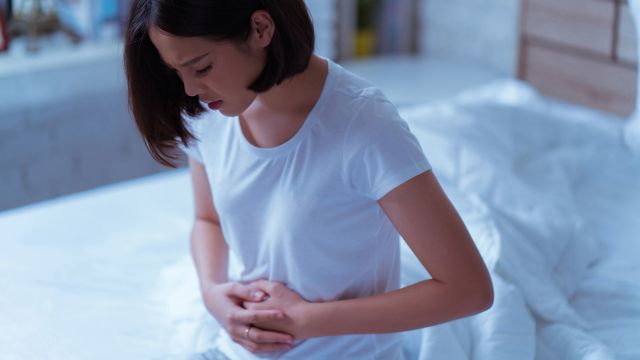Hemorrhoids. Not a popular topic, unless you’re desperate for a way to get rid of them. How can you find relief from painful, itchy hemorrhoids that can appear around your rectum—and prevent them from developing in the first place? In order to get to the bottom of this, we spoke with Warren Strutt, MD, a colorectal surgeon at Presbyterian/St. Luke’s Medical Center in Denver, Colorado.
Hemorrhoid basics
“By definition hemorrhoids are vascular cushions—veins—within the anal/rectal canal,” says Dr. Strutt. There are two types: internal—we’re actually born with three inside the anal canal—and external hemorrhoids, which can develop later in life.
“Internal hemorrhoids help keep a tight seal to the rectum,” says Strutt. In other words, once you’ve finished one bowel movement, the hemorrhoids help keep the door shut until the next one. Normally you wouldn’t even know these internal hemorrhoids exist—until problems develop.
External hemorrhoids occur any place around the anal canal, also called the anal verge. “External hemorrhoids are typically caused by a clot that gets trapped in one of the small veins,” says Dr. Strutt. “As a result, there's a lot of swelling, and that swelling stretches the skin that's in a very sensitive area, which causes severe pain.”
Typical causes of hemorrhoids include constipation, diarrhea, hard stools, straining when having a bowel movement, pregnancy and dehydration.
External hemorrhoid treatments
Strutt says that the majority of external hemorrhoids resolve themselves with non-surgical therapy, such as applying hydrocortisone cream. (Do not use a hydrocortisone cream for more than a week without your doctor’s okay.) He also recommends sitz baths to promote healing and ease pain. In addition, make sure your bowel movements are soft to avoid further irritation. “Drink lots of water, take stool softeners and eat a high-fiber diet,” he says. “I typically recommend a 20-gram fiber diet per day.”
Expect hemorrhoid pain to last about a week. “Essentially, the body absorbs the clot,” Strutt says. If the hemorrhoid worsens or does not resolve, see your healthcare provider to have it checked out.
Internal hemorrhoid symptoms
According to Strutt, the most common symptom people experience is painless bleeding when they have a bowel movement. The second is prolapse, where the internal hemorrhoidal tissue swells and gets big enough so that when you have a bowel movement, the tissue can actually protrude out of the anus.
There are four grades of internal hemorrhoids, classified by degree of prolapse:
- Grade 1: the hemorrhoid stays put, it doesn’t prolapse
- Grade 2: the hemorrhoid prolapses, then goes back to its original location after a bowel movement
- Grade 3: the hemorrhoid prolapses, but requires the patient to manually push it back into the rectum
- Grade 4: the hemorrhoid prolapses and stays outside of the rectum; pushing it back in doesn’t resolve the prolapse
One last worst-case scenario regards large internal hemorrhoids, which can cause anal seepage and incontinence. This happens, Strutt says, when the hemorrhoid doesn’t allow the anal canal to completely close. The seepage causes irritation and friction, along with quality of life issues.
Internal hemorrhoid treatments
Treating internal hemorrhoids is much the same as treating external ones as a starting point: use stool softeners, eat plenty of fiber, stay hydrated and take sitz baths. But if those steps don’t work, Strutt says there are two options for treating Grades 1 and 2. “One is sclerotherapy, where an irritant is injected at the apex of the hemorrhoid,” he says. “This causes it to shrink and stops any bleeding within about two weeks.” Strutt reports that while the procedure is painless, patients may feel mild pressure or discomfort for 24 to 48 hours following the injection.
Another treatment is hemorrhoidal banding, where a small rubber band is placed at the base of the hemorrhoid. “The band typically falls off in about 10 days,” Strutt says. He explains that this method, which can be done in the doctor’s office, is also painless, although you may feel a sense of “tightness” or a dull ache. While the procedures are low risk, Strutt says that banding isn’t an option for people on blood thinners.
Grades 3 and 4 typically require surgical removal—a 45-minute procedure done on an outpatient basis. Recovery time, Strutt says, is about a week out of work.
Hemorrhoid prevention
The best way to avoid hemorrhoidal problems is to maintain dietary and lifestyle habits that promote soft, bulky, easily cleaned stools and regular bowel movements. Get 20 to 25 grams of fiber in your diet each day, including plenty of fruits and vegetables. Exercise and stay hydrated. Strutt recommends drinking six to eight glasses of water per day. These habits can reduce your risk of developing hemorrhoids—and make those bathroom pit stops a lot easier. Dr. Strutt also recommends that any rectal bleeding should be evaluated by your doctor.






